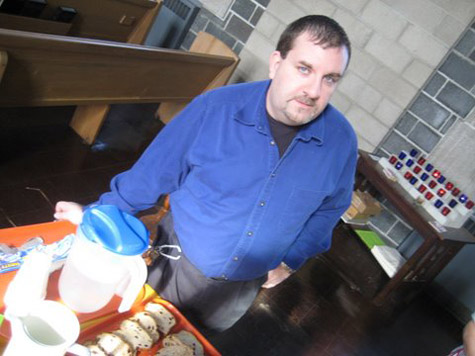
‘I’VE NEVER SEEN IT THIS BAD,’ Viou says. |
On a bitterly cold morning not long ago, Jerry Viou pulled into the parking lot at Open Table of Christ and a woman popped out from behind a dumpster and shouted, "Do you have food?''
Viou was so startled he jumped. When a woman hides behind a trash can at the crack of dawn waiting for the doors of a church to open so she can get a bag of potatoes, you know times are tough, he says.
"I've been doing this a long time and I've never seen it this bad,'' says Viou, the church's pastor of community ministries. "It's horrible.''
With the economy on the skids and an unemployment rate of nearly 13 percent — one of the highest in the nation — more Rhode Islanders are turning to food pantries, soup kitchens, and food stamps to keep them from going hungry.
New numbers released recently by the state and the Rhode Island Community Food Bank, which supplies food to pantries, should trouble anyone with a conscience or stake in the state's future.
An average of 52,450 people a month received food from pantries in 2009, an increase of 29 percent from 2008. What Andrew Schiff, the Food Bank's CEO, finds especially troubling is that many of the families have children — four in 10, which he says shatters the theory that people who go to food pantries are "down-and-out'' adults.
Food stamp use is also surging. About 129,400 people were receiving food stamps at the end of 2009, an increase of 40 percent from the same period a year before, says Donalda Carlson, of the state Department of Human Services.
Schiff estimates that 150,000 people — a staggering 15 percent of the state's population — are using food stamps, pantries or both. And in a state hit hard by job losses he doesn't see people climbing back any time soon.
"I don't know if public concern is at the level it should be,'' Schiff says. "We're in this for the long haul and that's what's so scary.''
You don't have to tell that to Viou, who sees hungry people every day at his church, which looms over a Family Dollar store, McDonald's, and boarded-up buildings on Broad Street in South Providence, the most impoverished neighborhood in the city. Back in November, members removed 23 pews from the chapel and rear of the sanctuary to make room for a food pantry, which had to be moved out of a moldy basement. But the demand for food was so great members realized they had to do more.
Now Viou says they plan to take out the remaining pews and turn the entire sanctuary into a pantry and, eventually, a community center that offers GED classes, job training, and other programs for the needy. They hope to sell the pews on eBay and use folding chairs for services. "We are an urban congregation in a very difficult part of the city,'' says Viou. "If that means we take out our pews and it looks like Sam's Club, then that's what we do.''